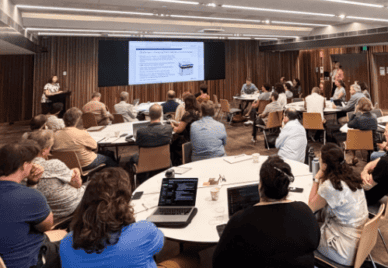
Workshop Addresses Wildlife Camera Trap, Ecoacoustic and Drone Data Challenges
Exploreabout Workshop Addresses Wildlife Camera Trap, Ecoacoustic and Drone Data Challenges
Four of Australia’s peak research agencies have joined forces to develop a new isotopic data platform that will support the verification of Australian agricultural and food product claims and environmental credentials.
Isotopes are unique chemical signatures or ‘fingerprints’ that can be used to tell us where our food comes from and how it was grown.
Accurate isotopic data is used as evidence to verify a product’s credentials or provenance for better market access, including addressing demands for low-emission or deforestation-free commodities in Europe.
The collaboration, co-invested with the ARDC through the Food Security Data Challenges program, brings together Australia’s national science agency CSIRO, Geoscience Australia, the Australian Nuclear Science and Technology Organisation (ANSTO) and the National Measurement Institute (NMI) to connect disparate and siloed data into a single national collection.
Speaking at the International Conference on Food Analysis in Melbourne in November 2023, CSIRO’s trusted supply chains expert Dr Nina Welti said there’s a wealth of valuable public isotopic data held within each organisation that needs to be brought together to tackle Australia’s export challenges.
“Isotopes not only tell us about food production, they also help us to better understand environmental factors such as soil nutrients and groundwater flows,” Dr Welti said.
“Connecting these rich databases in a way that’s trusted and shareable is key to supporting research for the public good, as well as commercial outcomes for Australia’s agriculture, food and water systems.
“It’s also about ensuring the long-term utility of data so that it can be used to build further trust in supply chains well into the future.”
Another key driver is enabling equitable access across industry to verification tools.
The collaboration, led by CSIRO through its Trusted Agrifood Exports Mission, is connecting datasets and insights across the supply chain to improve and grow Australia’s access to overseas markets.
Agricultural and food export trade is critically important to the Australian economy, fetching about $80 billion a year.
Verification tools can help Australia maintain key export markets, as well as enter new high-value markets.
For example, CSIRO undertakes greenhouse gas assessments for Australian canola to verify the product meets the European Union’s targets and is eligible to be used in biofuels.
NMI’s Analytical Services manager, Tim Stobaus, said the market demand and trade requirements for sustainable agricultural practices is increasing.
“Leveraging a stable isotope data platform can support innovation and insights to differentiate Australian products based on sustainable practices at the farm gate,” Mr Stobaus said.
“This data can assist in the evaluation of trade-offs and decisions in terms of yield, quality and management practices so that Australian agricultural commodities can reach previously unrealised premium markets and diversify their offerings to meet changing demands.”
Use cases from industry, peak bodies, universities and other research organisations will help to inform the national digital platform’s development, ensuring it is developed in a way that’s relevant, accessible and serves the needs of different sectors.
The project to connect and federate stable isotopic data resources led by CSIRO is one of 9 projects that the ARDC is investing in through the Food Security Data Challenges program. The projects are developing innovative digital infrastructure solutions with the aim of improving research into Australia’s production, consumption and distribution of safe and high-quality food. The 9 projects received a total of $3.6 million in investment from the ARDC’s Food Security Data Challenges Program, with a total of over $5.7 million co-investment from project partners.
Find out more about the ARDC’s Food Security Data Challenges program.
This project received co-investment from the ARDC. The ARDC is funded by the National Collaborative Research Infrastructure Strategy (NCRIS). This article is based on a CSIRO media release.